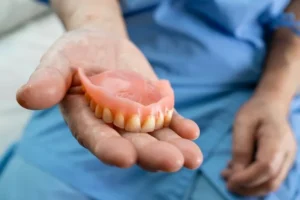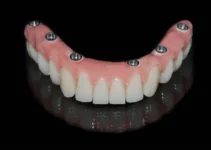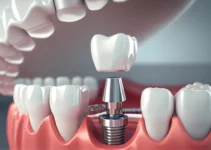Dentures on implants offer a revolutionary solution for those seeking a stable and natural-looking alternative to traditional dentures. This dental technique involves anchoring dentures onto titanium implants that are surgically placed into the jawbone, providing a secure base that mimics natural tooth roots. Not only do implant-supported dentures improve chewing ability and speech, but they also help preserve jawbone integrity and facial structure. In this article, we’ll explore the advantages of this method, the procedure involved, and what patients can expect during the transition.
Benefits of Dentures on Implants
Dentures on implants, also known as implant-supported dentures, offer a variety of advantages over traditional dentures. These benefits stem from the fact that the implants act as artificial roots, providing a stable and sturdy foundation for the dentures. This advanced dental solution significantly improves the quality of life for patients who require dentures.
Let’s delve into the key benefits of dentures on implants:
Improved Stability and Comfort
One of the most notable advantages of dentures on implants is the enhanced stability they offer. Traditional dentures can often shift or slip, especially while eating or speaking, causing discomfort and embarrassment. The implants securely anchor the dentures in place, preventing any unwanted movement.
This increased stability translates into greater comfort. Patients no longer have to worry about their dentures causing sore spots or irritation to their gums. With implant-supported dentures, the pressure is evenly distributed along the implants, reducing the likelihood of discomfort.
Another comfort factor is the elimination of the need for denture adhesives. Traditional dentures often require adhesives to stay in place, which can be messy and inconvenient. Implants provide a permanent solution that negates this requirement, making daily dental care more straightforward.
Enhanced Aesthetics
Dentures on implants provide a more natural-looking appearance compared to traditional dentures. The secure fit of implant-supported dentures allows for precise placement and alignment, resulting in a more realistic smile.
The implants themselves also help to preserve the facial structure. When natural teeth are lost, the jawbone can begin to deteriorate over time, leading to a sunken appearance in the face. Implants stimulate the jawbone, preventing bone loss and preserving the natural contours of the face.
This dental solution also offers a range of customization options. Patients can work closely with their dentist to choose the shape, color, and size of their dentures, ensuring a perfect match with their natural teeth.
Better Oral Health
Implant-supported dentures contribute to better oral health in several ways. One of the most significant benefits is the prevention of bone loss. As mentioned earlier, the implants stimulate the jawbone, maintaining its integrity and preventing the shrinking and weakening that can occur with tooth loss.
Additionally, because the dentures are securely anchored to the implants, there is less friction and movement on the gums. This reduces the risk of gum irritation and infections, promoting overall oral hygiene.
Implant-supported dentures also make it easier for patients to maintain their daily oral hygiene routines. Traditional dentures often need to be removed for cleaning, which can be cumbersome. In contrast, implant-supported dentures can be cleaned like natural teeth, encouraging consistent dental care practices.
The benefits of dentures on implants are substantial, ranging from improved stability and comfort to enhanced aesthetics and better oral health. Patients considering this option will likely find that it offers a more satisfying and effective solution compared to traditional dentures.
For more insights into advanced dental treatments and how they can enhance your oral health, be sure to read our other articles.
The Process of Getting Dentures on Implants
The process of getting dentures on implants is a multi-step journey that involves careful planning and precise execution. Dental implants offer a stable foundation for dentures, significantly improving both function and aesthetics. The process can vary based on individual needs, but generally follows a structured pathway to ensure optimal results and patient satisfaction.
This process is typically broken down into three main phases: the initial consultation, the implant surgery, and the healing period. Each of these phases is crucial for the success of the treatment and requires active participation from both the dental professional and the patient. Understanding each step can help alleviate anxiety and provide a clear roadmap for what to expect.
Initial Consultation
The initial consultation is the first step in the journey toward getting dentures on implants. During this appointment, the dentist will thoroughly examine your mouth, which may include taking X-rays and digital scans. This step is crucial for assessing the quality and quantity of your jawbone, which will determine your suitability for implants.
This consultation is also an opportunity to discuss your medical history and any medications you are taking, as certain conditions and drugs can affect the healing process. The dentist will also explain the implant procedure, discuss potential risks and benefits, and answer any questions you may have. This open dialogue ensures that you are fully informed and comfortable with the treatment plan.
If you are deemed a good candidate for the procedure, the dentist will then create a customized treatment plan tailored to your specific needs. This plan will outline the number of implants required, the type of dentures to be used, and the estimated timeline for the entire process.
Implant Surgery
Once the treatment plan is finalized, the next step is the implant surgery. This phase involves the surgical placement of titanium posts into the jawbone, which will serve as the anchors for your dentures. The surgery is usually performed under local anesthesia, but sedation options are available for those who experience anxiety or prefer to be more relaxed during the procedure.
The dentist will make small incisions in the gum tissue to expose the bone. Holes are then drilled into the bone, and the titanium posts are inserted. These implants are biocompatible, meaning they are designed to integrate with the natural bone tissue over time. This integration is critical for providing a stable and secure foundation for the dentures.
After placing the implants, the gum tissue is sutured, and the healing process begins. Patients may experience some discomfort and swelling after the surgery, but these symptoms can typically be managed with over-the-counter pain relievers and ice packs. It’s essential to follow all post-operative care instructions provided by your dentist to ensure a smooth recovery.
Healing Period
The healing period, also known as osseointegration, is a crucial phase in the implant process. During this time, the bone will grow around the titanium posts, effectively anchoring them in place. This process can take anywhere from 3 to 6 months, depending on individual healing rates and bone quality.
During the healing period, it’s important to maintain good oral hygiene and follow a soft-food diet to avoid disturbing the implants. Regular follow-up appointments with your dentist are essential to monitor the progress of osseointegration and address any issues that may arise. Your dentist may also provide temporary dentures or bridges to wear during this time, ensuring you can continue with daily activities without significant disruption. Once the implants have fully integrated with the bone, the final step involves attaching the custom-made dentures to the implants. These dentures are designed to fit precisely and comfortably, providing a natural look and feel. With proper care and maintenance, dentures on implants can last for many years, offering a durable and effective solution for missing teeth.
The journey to getting dentures on implants is a complex but rewarding process that can significantly enhance your quality of life. For more in-depth information on related topics, be sure to explore our other articles.
Types of Dentures on Implants
Dentures on implants offer a revolutionary solution for individuals dealing with tooth loss. These types of dentures are supported by dental implants, which are titanium posts surgically inserted into the jawbone. The implants provide a stable and permanent base for the dentures. Depending on the patient’s needs and oral health, different types of implant-supported dentures can be used. This section will delve into three primary types: Full Arch Implant Dentures, Partial Implant Dentures, and Overdentures.
The choice of denture type depends on various factors including the extent of tooth loss, jawbone density, and patient preference. Each type offers its own set of advantages and is designed to enhance the quality of life, restoring both function and aesthetics. Understanding the differences can help in making an informed decision best suited to your dental needs.
Full Arch Implant Dentures
Full Arch Implant Dentures are an excellent option for patients who have lost all of their teeth in either the upper or lower arch. These dentures are typically supported by four to six implants that are strategically placed in the jawbone. The full arch prosthesis is then attached to these implants, providing a stable and permanent solution.
One of the biggest advantages of Full Arch Implant Dentures is their stability. Unlike traditional dentures, they do not slip or shift, making it easier to eat and speak. They are also designed to look and feel like natural teeth, offering a significant boost in confidence and quality of life.
Additionally, Full Arch Implant Dentures help in maintaining the jawbone structure. Without the roots of natural teeth, the jawbone can deteriorate over time. Implants stimulate the bone, preventing bone loss and maintaining facial structure. This makes them a long-term investment in your overall oral health.
Partial Implant Dentures
Partial Implant Dentures are ideal for patients who are missing several teeth but still have some healthy natural teeth remaining. These dentures are anchored to one or more implants, filling the gaps left by missing teeth. This type of denture offers a less invasive option compared to Full Arch Dentures but still provides robust support.
Partial Implant Dentures offer the dual benefit of preserving the remaining natural teeth while providing strong support for the dentures. The implants ensure that the dentures remain stable, minimizing movement and enhancing comfort. This allows patients to enjoy a wide range of foods and engage in social activities without the worry of denture slippage.
These dentures also contribute to better oral health. Since the implants take on much of the bite force, the natural teeth experience less wear and tear. Moreover, the implants help to maintain the jawbone, reducing the risk of bone loss in the areas surrounding the missing teeth.
Overdentures
Overdentures are a versatile type of denture that can be used for patients with varying degrees of tooth loss. These dentures are designed to fit over existing teeth or dental implants, offering an additional layer of stability. Overdentures can be used in both full and partial scenarios, making them a flexible option for many patients.
One of the main benefits of Overdentures is that they can be removable or fixed, depending on the patient’s preference and the dentist’s recommendation. Removable Overdentures are easier to clean and maintain, while fixed Overdentures offer greater stability and function similar to natural teeth.
Overdentures supported by implants offer enhanced stability compared to traditional dentures. The implants help to anchor the denture in place, preventing movement and increasing comfort. This can make a significant difference in everyday activities such as eating and speaking.
Moreover, because they are supported by implants, Overdentures also contribute to the preservation of the jawbone. The implants provide the necessary stimulation to the bone, preventing the bone loss that often accompanies tooth loss. This helps to maintain the patient’s facial structure and overall oral health.
Understanding these different types of dentures on implants can guide you in making an informed decision tailored to your specific needs. Each option offers unique benefits and can significantly improve your quality of life. For further reading on this and other dental topics, explore our other articles.
Aftercare and Maintenance
Once the dental implant procedure is complete, the aftercare and maintenance become crucial for the prolonged success and functionality of the implants. Proper aftercare ensures that the implant integrates well with the jawbone and prevents any potential complications such as infections. It is imperative to follow the postoperative instructions provided by your dental specialist to avoid problems and promote optimal healing.
The longevity and performance of dental implants heavily depend on how well they are maintained. This includes adhering to a rigorous cleaning regimen, attending regular dental check-ups, and adopting good oral hygiene practices. These steps not only extend the life of the implants but also contribute to overall oral health. Understanding the importance of aftercare will set the foundation for a lifetime of healthy and functional dental implants.
Daily Cleaning Routine
A meticulous daily cleaning routine is vital when it comes to maintaining dental implants. Much like natural teeth, implants can accumulate plaque and tartar, which may lead to gum disease and peri-implantitis, a condition specifically affecting the tissues around dental implants. To prevent these issues, it is essential to brush at least twice a day using a soft-bristled toothbrush and non-abrasive toothpaste.
Here is a basic guideline for maintaining a daily cleaning routine:
- Brush your teeth and implants for at least two minutes, ensuring you reach all surfaces.
- Use an interdental brush or floss to clean between the teeth and around the implant abutments.
- Consider using a mouthwash that is specifically designed for implants to reduce bacteria and freshen breath.
Advancements in dental technology have also introduced specialized cleaning aids such as water flossers and antimicrobial rinses, which can further enhance your daily cleaning routine. It’s recommended to discuss these options with your dentist to find the most suitable tools for your specific needs.
Regular Dental Check-ups
Regular dental check-ups play an integral role in the aftercare of dental implants. These appointments allow your dental professional to monitor the health of your implants and surrounding tissues. During these visits, your dentist will perform a thorough cleaning to remove any plaque or tartar buildup that may not be addressed by regular brushing and flossing.
Consistency in attending these check-ups is crucial as they help in the early detection and treatment of potential issues. Typically, it is recommended to visit your dentist every six months. However, the frequency may vary based on individual needs and the overall condition of your oral health.
During these visits, your dentist will also take the opportunity to evaluate the bone integration and stability of the implants through diagnostic tools such as dental X-rays. These examinations are essential to ensure the longevity and robustness of the implants. Embrace the commitment to your dental health by diligently following your aftercare routine and attending regular check-ups. By doing so, you ensure the lasting success of your dental implants. For more insights on dental care and health, feel free to explore our other informative articles.
Common Questions About Dentures on Implants
Understanding the basics of dentures on implants can help you make informed decisions about your dental health. Here’s a common question many patients have when considering this dental solution.
What are the main benefits of choosing dentures on implants over traditional dentures?
Dentures on implants offer several benefits compared to traditional dentures. Firstly, they provide increased stability and durability because the implants act as a firm anchor in the jawbone, preventing the dentures from slipping or moving. This results in improved comfort and confidence while eating and speaking. Additionally, implants help maintain jawbone structure, preventing the bone loss that often accompanies traditional dentures. This can lead to better oral health and a more youthful facial appearance over time.

My name is Salman Kapa, a 73-year-old expert in bone regeneration and dental implantology. With decades of experience in the field, I am dedicated to advancing our understanding of oral health and hygiene. Through my research and writing, I aim to contribute to the development of innovative solutions in dental care.




